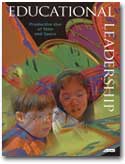Conservative economists seem to pop up everywhere these days, making pronouncements not only about economic trends but about everything else as well. Despite a prediction record less accurate than TV weather forecasts, their utterings have assumed totemic stature. As the high priests of our commercial culture, right-wing economists attempt to interpret the obscure scratchings of the invisible hand for the rest of us.
Undeterred by their inability over the last decade to predict whether the stock market will go up or come down—a subject germain to their discipline—market economists have increasingly taken up the issue of school reform (for example, Hanushek et al. 1994, Moe and Chubb 1990). Armed with their crude models of human behavior, a childlike faith in economic “laws,” and a narrow ideology that bends and shapes all human relationships into a form that suits their econo-centric logic, these economists now presume to tell us whether or not money matters in the education of our young.
We don't need an economist to tell us whether or not money matters. What does seem to confuse many people, however, is the different way in which money matters in private and in civic affairs. The fact that some of us can afford to buy a new Cadillac while others can only afford to buy a used Chevette is no insult to our constitutional values, nor is it a challenge to our democratic culture. The way we spend public money on schools is, however, a very different story.
Our constitutional values require that each child have an equal claim on whatever resources we provide for public education. In practical terms, this means spending at least as much money on children living in poverty as we spend on their wealthier brothers and sisters. To spend enough to buy a Cadillac education for some children while others must settle for a used Chevette is an obvious affront to our constitutional principles. It reflects the decision to treat some children as more valuable than others. Unfortunately, the current debate over education spending often manages to obscure this simple truth.
Conservative Economic Logic
Proposals to redress educational funding inequities are now commonly countered with the assertion that the amount of money spent on schools has no systematic relationship to student performance—an assertion based on dubious research. Even granting the importance of the concern that the money spent on schools be well spent, this concern is irrelevant to the issue of school funding equity. That issue of equity in funding can only legitimately be understood by referring to constitutional values and social ethics.
The importance of just funding for public schools is further obscured by the now common argument that the most important school funding issue is not the unequal distribution of resources but the way in which money is spent within the current structure of resource allocation. This argument inevitably leads to the completely unreasonable speculation that if only impoverished city school systems would learn how to spend more wisely the money they do have, they could perform as well as, say, an exclusive private prep school that spends twice as much per pupil, or a religious school with a selective admission policy. From this point, it is only a short jump to the conclusion that any money spent to redress school funding inequities is money wasted. Unfortunately many policymakers today give credence to this conclusion.
The claims that the amount of money spent does not matter when it comes to student achievement; that schools serving poor children can make up for having less money by spending it more wisely; and that any increase in spending to reduce funding inequities is money wasted, are politically very attractive. Public schools become the enemy, not economic and political injustice.
The political effectiveness of framing the debate in these terms is reflected in the number of politicians who now claim to serve poor students by starving for funds the schools those children attend. As they rush to embrace “reforms” like private school choice, charter schools, and privatization, some politicians are willing to fund these fantasies through reducing the amount of money available for public schools that serve poor students.
Time for a Real Debate
It is vital that we have a serious debate about both the amount of money we are willing to spend on the education of our young and how to fairly and wisely spend it. Sadly, what we have instead of a real debate is a celebration of conservative economic conventional wisdom constructed out of contradictory research findings and self-serving political ideology. At the same time, better research that yields real promise for increasing the academic achievement of poor children is dismissed because the findings cost money to implement.
As we continue to turn our backs on our fundamental constitutional values, the desperation in our inner cities grows ever worse. Surely it is a situation for which we will all one day pay a high price.
